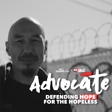
Being a Survivor Leader with Oree Freeman| Trafficking Free America Podcast
What does it truly take to be a survivor leader? In this heartfelt and unfiltered episode of the Trafficking Free America Podcast, we explore the raw truth behind leadership after trauma, featuring a powerful solo reflection from a survivor turned advocate and mentor.
From the early days of toxic jobs and missed opportunities to hard-earned wisdom about accountability, grace, and healing—this episode is a blueprint for nonprofits, leaders, and anyone who wants to build safe spaces where survivors don’t just heal—they lead.
This is for the dreamers, the overcomers, and the ones still figuring it out. If you've ever asked, "How can I help survivors lead?" — start here.
🔗 Learn more or support the mission: https://www.usiaht.org
❤️ Become an Abolitionist: https://usiaht.org/donate/
⏱ Timestamps
00:00 – Leadership starts with vulnerability and healing
00:29 – Welcome to the podcast: today’s topic hits close to home
01:25 – What is a survivor leader, really? What do they need to thrive?
02:17 – You don’t need a degree to lead—you need lived experience
03:20 – Becoming a servant leader starts with how you care for yourself
04:53 – The honesty of growing up while still carrying trauma
06:00 – When grace meets accountability: how employers helped me grow
07:15 – A probation officer’s simple act that changed everything
08:52 – The Denny’s job that gave me dignity and basic life skills
10:24 – Learning what healthy structure and family really looked like
12:00 – How lying to those who loved me led to consequences—and growth
13:46 – What every survivor needs more than a paycheck: mentorship
15:04 – Why healing must come before service work
16:36 – You don’t have to lead like anyone else—just be faithful to your process
17:50 – SWOT yourself: Strengths, Weaknesses, Opportunities, Threats
18:24 – Integrity, consistency, therapy, and the lifelong work of growth
19:46 – Final encouragement: Finish well. Pass the baton. You got this.
🙌 Key Takeaways:
- Being a survivor leader isn’t about perfection—it’s about persistence
- Healthy leadership is rooted in therapy, boundaries, mentorship, and truth
- Nonprofits should build systems that empower—not just employ—survivors
- Your healing journey is not a job description. It’s a foundation.
🎧 Listen. Reflect. Equip. Whether you’re a survivor, an ally, or a nonprofit leader, this conversation is a mirror and a map.
Subscribe, share, and support to help us build a Trafficking Free America—together.
#TraffickingFreeAmerica #SurvivorLeadership #HumanTrafficking #AntiTrafficking #HealingJourney #LeadershipAfterTrauma #USIAHT #Podcast

